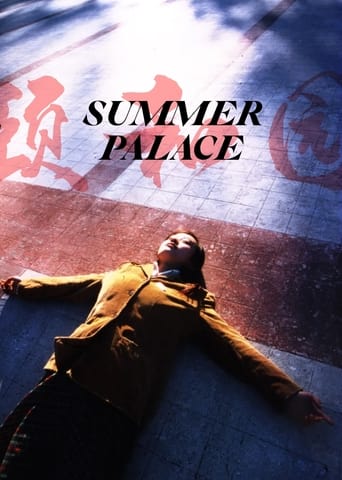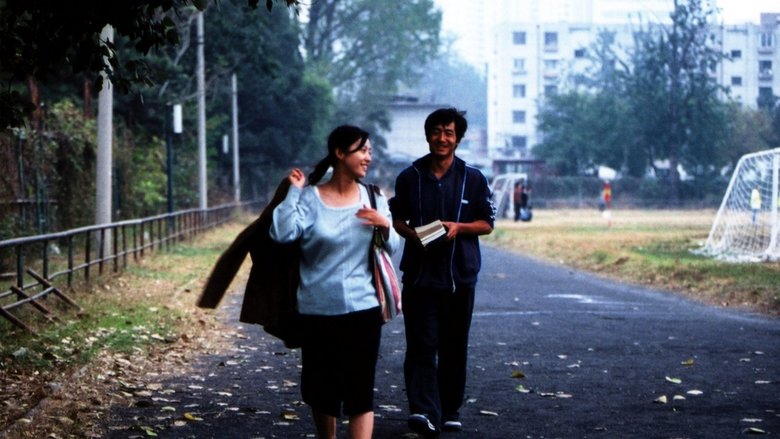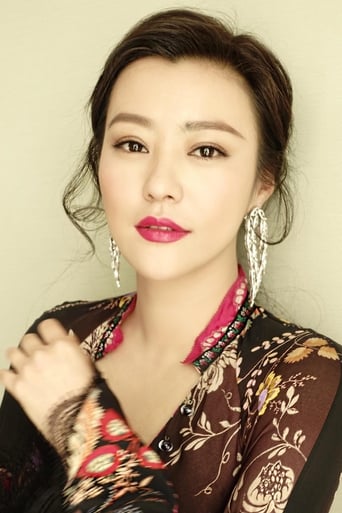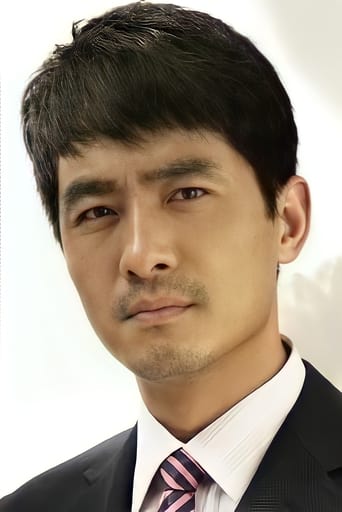

Summer Palace (2006)
Country girl Yu Hong leaves her village, her family and her lover to study in Beijing. At university, she discovers an intense world of sexual freedom and forbidden pleasure. Enraptured, compulsive, she falls madly in love with fellow student Zhou Wei. Driven by obsessive passions they can neither understand nor control, their relationship becomes one of dangerous games - betrayals, recriminations, provocations - as all around them, their fellow students begin to demonstrate, demanding democracy and freedom.
Watch Trailer
Cast
Reviews
Best movie ever!
Great example of an old-fashioned, pure-at-heart escapist event movie that doesn't pretend to be anything that it's not and has boat loads of fun being its own ludicrous self.
The film never slows down or bores, plunging from one harrowing sequence to the next.
It's simply great fun, a winsome film and an occasionally over-the-top luxury fantasy that never flags.
This film is about several Chinese people, about how they grow up and how time changes them. It is focused on one couple, the very intense passion that they feel for each other and the paths that life shows them in relation of what they feel in each step of their lives...This movie is centered in love. More exactly, it is centered in the romantic view of life, which is destined to collide with the fact of growing up, because the characters in the film just can't manage to keep their passionate feelings while they start living other things after leaving university. It is as if life and circumstances pushes them to leave behind their memories, the anchor that seems to keep the characters living and knowing that they are someone. I think it is interesting how this is managed as the film goes by, because I recognized this feeling in myself and among my friends: about how, by leaving school, you have the feeling to be adrift in the universe of life.Also, the passion that the characters feel becomes sedated by the tedium of their lives after school. I think the director tries to communicate that feeling: after university, the characters start to get bored with their lives, compared with what they lived in school. It is sad to look how the woman character struggles to keep that feeling alive, but always feeling depressed because she can't grasp that passion that just goes away. They travel, they meet other people, they get jobs, but simply it's not the same. This is also related to the student's protests in China, all the feelings and expectations they generate, and the disillusion they found when they have to confront the real world.Finally, I think what the film communicates, is that every emotion, love, feeling or whatsoever, is seized by time. This is something that the characters just don't get and the reason of why they suffer: they can't accept that they are different from the ones that were young and passionate. Even in long marriages, couples have to reinvent themselves to keep together each other, or simply they fall in the arms of custom. This last thing is what the characters refuse to do, always trying to keep their feelings alive. But that's also the reason of why they suffer, especially the woman character: they live attached to their memories and they leave part of their identity in the past. I think that a phrase that is showed in the french movie "Irreversible" could fit perfectly on this one: TIME DESTROYS EVERYTHING. But in this film, this phrase applies in a more subtle way, in something that involves people's identities.I liked the movie. It was one of those which you can't get out of your head for the rest of the day. The acting is good and the music is great. If there is something to criticize, is that the film is a little bit too long for what it express, specially at the second part of the film. I found other criticism unfounded: sex is an important part of the film, since it express passion, and it's definitely NOT a soap opera, because it doesn't have a happy ending and it has a message that you have to discover by thinking and feeling the film.I recommend this one.
First time to watch Ye Lou's movie, I think it's not a perfect film, but certainly it's a good one.He is good at depicting the love deep in the heart:the love with desire,contradiction,unfaith,loss and the future.The film can remind your past time while you were young,can make you miss your lost romantic, can make you think over the love,the youth.So, a beautiful love drama it is.I also have to mention this backdrop of the 6/4 incident happened in Beijing in 1989 in the movie,as I known, no other directors in China dared to take this backdrop in any movies up to now, so I respect Mr.Lou's courage. At last I think the best character in the drama is Li Ti played by Ling Hu .The flaw of the film is at the end when Yu Hong and Zhou Wei met, I think, the process is not very good.
What is the rationale for director Lou Ye to name the movie Summer Palace, or known as Yi He Yuan in Mandarin? Perhaps it is because, the story begins with a girl named Yu Hong (Hao Lei) who was sharing her passionate moments with her boyfriend Xiao Jun at Tumen, a rural area at the border between China and North Korea in the 80's, before leaving the hometown to study in a university in Beijing.And perhaps it is because when her new friend, Li Ti, introduces Zhou Wei (Guo Xiao Dong) to her, that makes Yu Hong and Zhou Wei falling in love with each other instantly, that they spend their summer in dormitory, having endless sex. Their relationship has been going on and off during this period, until the Tiananmen incident broke out in 1989, which causes deaths to hundreds of university students in China.For that, you have seen half of the story. And yes, that is what we get for Summer Palace, without seeing much direct relationship between the famous imperial palace and the love and sex of a young couple.As what Yu Hong said in her diary, she is excited to meet new guys, but always ends up having sex with them as she thinks of her first time meeting Zhou Wei. The message we received from her was: sex has been an outlet to release her fear and anxiety, together with the love she still holds for Zhou Wei.Lou Ye has explained the inner world of Yu Hong in the first half of the story. But the second half seems to drag the movie down. The movie continues with the government declaring an state of emergency during the Tiananmen incident, and it was fast forward to the year 1998, with footages of several incidents that took place in China and the communist country in the world. The next moment, we see how Yu Hong and Zhou Wei lead their individual life in ShenZhen and Berlin respectively, without much explanation on what has happened to them throughout the years.To make the dry spell more unbearable, the 140 minutes drama lacks a solid detail to support a good storyline. Not much details were explained, which makes the movie pretty dull and draggy. The sex scenes featured in the film also makes it seems to be a cheap pornographic production. But, to the filmmakers in China, Summer Palace is the first made in China production that openly explores sex, which is very rare. The explicitness of the scenes has made Summer Palace the first movie in China that is challenging the censors of China. (Which explains why the movie was banned in China for discussion of Tiananmen incident, tonnes of sex scenes and participating in Cannes Film Festival without approval from the authorities.) The summer could be enjoyable if more juices can be provided in the palace.
Lou Ye's "Summer Palace" ("Yihe yuan") has plenty of frontal nudity and a fair number of (not very attractive) sex scenes, but that's not why the movie was banned by Beijing, and Ye forbidden to work in the film industry for five years.More likely, official displeasure was incurred by the film's powerful recreation of the Tiananmen events of 1989, from the students' point of view - and, coincidentally, equaling Tolstoy's representation of the chaos of war in the Borodino scenes of "War and Peace." And yet, all that is besides the point. Rather, after tonight's screening of "Summer Palace" in the Castro, at the 25th annual San Francisco International Asian American Film Festival, your bewildered and overwhelmed reporter is positing this central question: whither Lou Ye? After those five years (or making movies elsewhere) will Ye become the new Zhang Yimou and China's best or just an imitator of the loathsome Tsai Ming-liang, teasing and torturing the audience... just because he can? My money - and hope - is on the better scenario. However strange and convoluted and bizarre and frustrating "Summer Palace" may be, it appears "sincere" and not reaching for effect. It's a magnificent failure or a miserable masterpiece, a stupid soap opera or a splendid insight into the human condition - the choice is up to you; for me, it was all that, and more. Seen so far only at film festivals (Cannes, Toronto, Mill Valley, Pusan and Oslo), the film is due for release in France next month and not, so far, in the U.S.Lack of commercial exposure may not be a bad thing. This is a "festival film," if there was ever one, and watching it on DVD may be the next best thing. If it came to theaters in this country, few people would go to see it, and of those, many would leave long before its conclusion 2 hours and 20 minutes later. And yet, and yet...The script - also by Ye, apparently heavily autobiographical - follows a group of young people from their Beijing University days in the 1980s through the present. The central character is Yu Hong, a teenager from the countryside. As played by Lei Hao - with little of Zhang Ziyi's physical charms and a hundred times her acting ability - here is a cinematic heroine for the ages: a complex, puzzling, neurotic young woman with touching aspirations and scary unpredictability. Lei Hao becomes the character in a naked, unselfconscious, totally believable way - she alone make "Summer Palace" a must-see film (except that you can't).Ye's way of telling the story is personal, iconoclastic, dragging here, speeding up there, taking us to Berlin (?!), unintentionally nonlinear, showing Yu Hong is similar situations time and again - and yet slowly spinning an intelligent, poetic subtext in the background.Hard as it may be to imagine, "Summer Palace" has something in common with Alain Resnais' "Last Year in Marienbad," in its wistfulness, lack of specific believability and yet presenting a feeling that makes perfect "sense." There are a hundred things "wrong" with Ye's work and yet it's one of the more memorable films in years.


